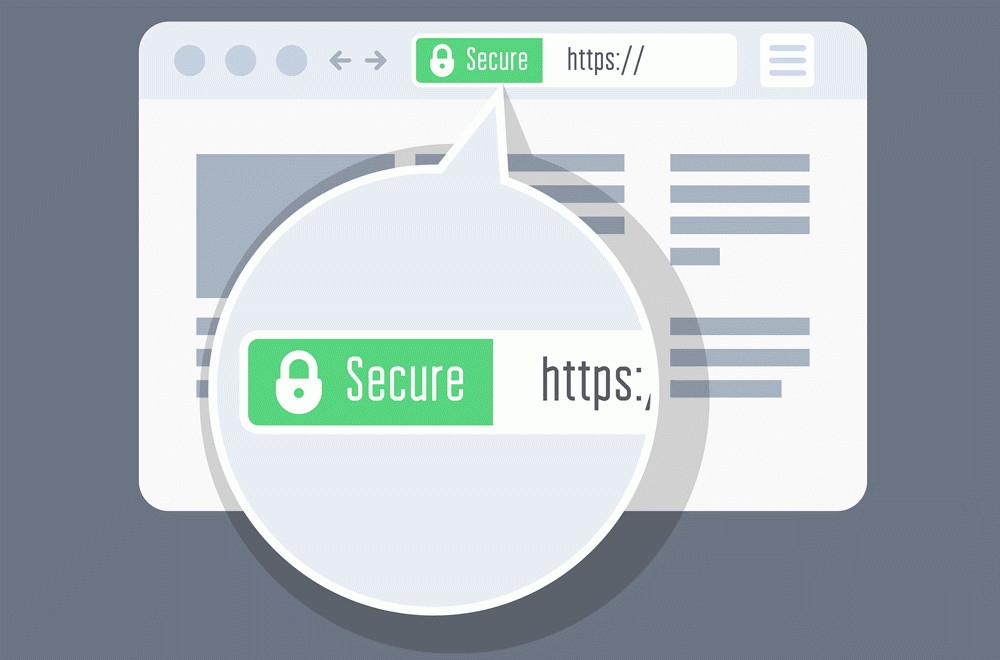Benefits of SSL Certificate
Yes, it’s a considerable investment but its worth every penny. If you don’t believe, then consider the following SSL certificate benefits:
1. Secure Website
Every connection is secured, and a random third party can’t access all the data transferred through it. Your visitors will trust your website more if they see a secure HTTPS connection. You don’t want your audience to come across the following message: “This website is not secure.” If they see this message, they will avoid your website in the future. Having an SSL Certificate can keep you safe from this embarrassment. The HTTPS shows your website has installed an SSL certificate. It helps you prevent security breaches and get secondary authentication in the shape of PKI. It helps to send information only to the receptive server. This way, the data won’t be accessible from other devices even if they share the same service. This server is more of digital documentation. It verifies the following credentials:
Certificate Holder Serial Number Expiry Date Signature of Authority
Since 2017, it has become imperative to install an SSL certificate as Google can possibly flag websites without this security measure.
2. Encryption
As you improve the security of your website, you can encrypt the sensitive information changed between one device to another. This information can be anything from credit card details, to password or bank details.
3. Authentication
When visiting a website, especially when submitting information or files through the server, the SSL makes sure that it’s the right website, and it goes to the right server. SSLs act as proof that this is indeed your website and not some imitation. It will help you against phishing sites that are trying to exactly imitate your website’s design and look to obtain sensitive information.
4. Trustworthy Branding
Even if you don’t run an e-commerce store, you must have an SSL certificate. It helps your customers to trust you. If people don’t trust you, they won’t visit your site or buy stuff from you. SSL certificate is one of the factors that show clients you care about them. The best thing about SSL certificates is they are affordable and easy to install. Once you install the certificate on your website, you will portray yourself as a professional and reputable brand that cares about its clientele.
5. SEO Boost
Does SSL certificate help SEO? To reward you for installing an SSL certificate, Google might improve your search engine rankings. Yes, the Benefits of SSL include SEO ranking parameters. Therefore, if you are having issues ranking your website, then you might want to install an SSL certificate.
6. Website Speed
It used to be a common misconception that an SSL certificate slows down your speed. We want to debunk this myth. Yes, HTTPS makes your site load faster instead of slowing it down. It improves your website’s performance, optimization, and marketing.
7. Affordable
Buying an SSL certificate won’t cost you much. You are left with hundreds of options, and a lot of them are affordable. Hosting services offer SSL certificates at discounted prices, and you can choose from different brands and types. You may also use a free SSL certificate for your website or blog like Let’s Encrypt or take help from your web hosting providers.
8. Easy to Install
You don’t have to be a technical guru to install an SSL certificate. You can install the certificate through most control panels with a few clicks, and some hosting companies offer 24/7 managed support that can install the certificate for you. You can change the HTTP into HTTPS with the following steps:
Buy an SSL certificate Install the certificate, take precaution if you use a shared hosting service Change every link from HTTP to HTTPS Redirect your traffic to the revised links to assure their safety Update Analytic tools and Search Console for secure tracking
Conclusion
The main benefit among other benefits of an SSL certificate is, it protects data using encryption and protects the privacy of your customers and visitors. Nonetheless, it improves your user’s overall experience with your website.
